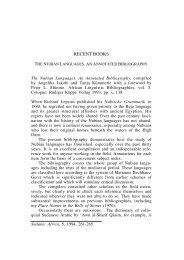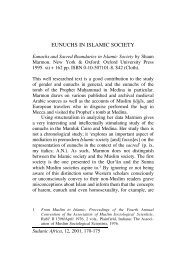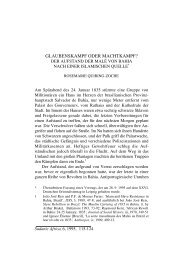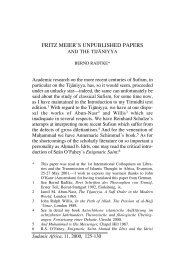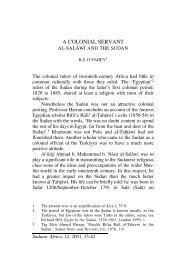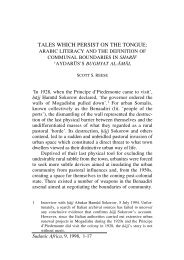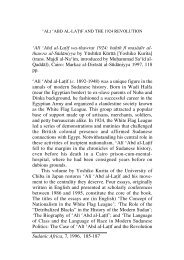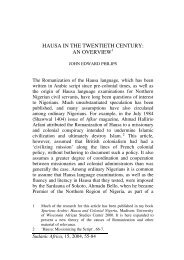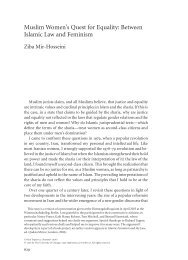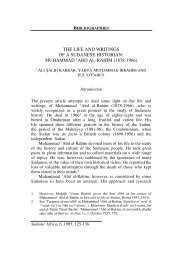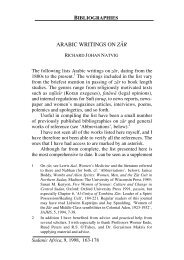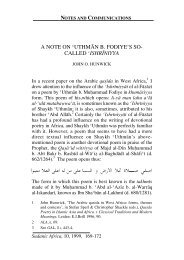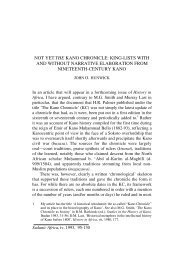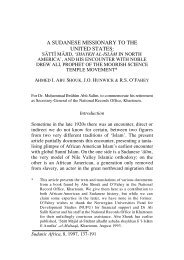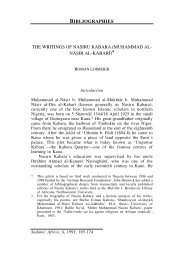The Mahdiyya, Bib. - Centre for Middle Eastern Studies
The Mahdiyya, Bib. - Centre for Middle Eastern Studies
The Mahdiyya, Bib. - Centre for Middle Eastern Studies
You also want an ePaper? Increase the reach of your titles
YUMPU automatically turns print PDFs into web optimized ePapers that Google loves.
136 AHMED IBRAHIM ABU SHOUK<br />
Yusuf Badri 5 have criticised these propagandist products,<br />
considering them as works biased against the Mahdist<br />
revolution and the Mahdist state. <strong>The</strong>ir argument is that the<br />
works in question were heavily influenced by the war<br />
propaganda to prepare the British public opinion <strong>for</strong> the<br />
eventual ‘reconquest’ of the Sudan.<br />
<strong>The</strong> best examples of such works are the four accounts<br />
of the European prisoners Slatin, Ohrwalder, Guzzi and<br />
Rosignoli, who had been in the custody of the Mahdist<br />
regime <strong>for</strong> varying lengths of time. <strong>The</strong> two most famous are<br />
the accounts of Father Joseph Ohrwalder and of Rudolf<br />
Stalin, both translated into English and edited by Francis<br />
Reginald Wingate under the titles Ten Years’ Captivity in the<br />
Mahdi’s Camp (1892) and Fire and Sword in the Sudan<br />
(1886), respectively. Wingate’s own famous book, Mahdiism<br />
and the Egyptian Sudan, published in 1893, can also be<br />
classified in this category, considering that it was written on<br />
the basis of intelligence reports and interviews with<br />
Egyptian, Sudanese, and other eyewitnesses who had either<br />
visited or resided in the Mahdist Sudan.<br />
Besides these five European accounts, one can add three<br />
other propagandist works published after the breakdown of<br />
the Mahdist state in 1898. <strong>The</strong> first was the account of the<br />
German trader Charles Neufeld, who had been on a<br />
commercial visit to the Sudan in 1887. He was captured by<br />
the Mahdists and transferred to Omdurman, where he spent<br />
twelve years in prison. His account, written in German, was<br />
translated into English under the title of A Prisoner of the<br />
Khaleefa: Twelve Years’ Captivity at Omdurman. <strong>The</strong><br />
second was the account of Ibrapplehım Fawzı, secretary of<br />
Charles Gordon, who had been captured by the Mahdists<br />
Asian <strong>Studies</strong> (Occasional Paper 12), 1978.<br />
4 Abbas Ibrahim Mu˛ammad Ali, ‘Contemporary British views on<br />
the Khalifa’s Rule’, Sudan Notes and Records, li, 1970, 31-46.<br />
5 Gasim Yusuf Badri, ‘A critical analysis of British historical<br />
writings on the <strong>Mahdiyya</strong> of the Sudan’, MA <strong>The</strong>sis, American<br />
University of Beirut 1971.



